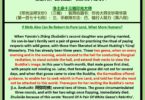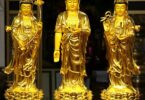◎ 天竺 • 婆罗门
[Ancient] India: Brāhmin
昔天竺阿输沙国,一婆罗门,愚痴无智,爱妇情深,不知厌足。
[In] past India’s Āshūshā country, [there was] a Brāhmin, ignorant [and] without wisdom, [who] loved [his] wife [with] deep passion, without knowing weariness [or] satisfaction.
[Note 1: In other words, he was with much worldliness such as lustfulness and little spirituality.]
其妇信佛,击金鼓唱阿弥陀佛。
His wife [had] Faith [in the] Buddha, [and would] beat [a] golden drum [while] reciting Āmítuófó’s [name].
[Note 2: This is similar to beating a wooden fish (打木鱼) while reciting sūtras in Chinese Buddhist culture, using it as a Dharma instrument (法器) for pacing chanting.]
时夫拉入宿,妇乃与约,每夕同击金鼓唱佛毕,始宿。
Often, he [would] pull [her to] enter [their room to] spend the night. [His] wife then with [him had an] agreement, [that] every night, [they will] together beat [the] golden drum [while] reciting [the] Buddha[‘s name, with this] completed, only then spending the night [together].
[Note 3: This is skilful use and transformation of his lustful desires, to become motivation for some daily spiritual practice, even if only for a short duration each time.]
婆罗门如言,行至三年,病死,五日复苏。
[The] Brāhmin as said, practised [this for] three years. [Thereafter, due to] sickness, [he] died. Five days [later, he] revived.
[Note 4: He resurrects to live a ‘normal’ yet extended life. This reminds us that Āmítuófó is also the Buddha Of Immeasurable Life (无量寿佛), who is able to offer blessings for healing of sicknesses and lengthening of lives where possible, though lasting healing and immeasurable life is to be attained by reaching his Pure Land.]
泣语妇曰:「吾死将入镬汤地狱,鬼卒以铁杖打罪人,击镬发音,吾惊魂昏愦,记汝击金鼓念佛声,遂唱南无阿弥陀佛。
Crying [to his] wife, [he] said, ‘I [had] died [and was] going [to] enter [a] cauldron’s hot water [in] hell, [when a] ghostly [demon] soldier with [a] metal staff striking [those] people with transgressions, [also] struck [the] cauldron, [thus] emitting [a] sound. [As] I [was] frightened [and] confused, [I] remembered your beating [of the] golden drum’s sound [with] reciting [of the] Buddha[‘s name, and] thereupon recited Āmítuófó’s [name].
[Note 5: Due to the much previous conditioning of regular hearing of the drum, this helped him to readily relate it to the sound of the cauldron being struck, in turn ‘automatically’ hearing it as a reminder to be mindful of Buddha. As such, his reciting of the Buddha’s name in hell, although intentional, was also habitual and somewhat ‘accidental’.]
[Note 6: Note that the ‘ghostly demon soldiers’ are ‘ghostly’ not because they are actual ghosts or other hell-beings, or they would be creating negative karma by inflicting suffering on others, yet with no lower realm to be karmically reborn in. They are ‘ghostly’ (as in not substantial) and ‘demonic’ (as in being terrifying) as they are natural manifestations from the negative karma and guilty minds of those people with transgressions.]
[Note 7: The hungry ghost realm (饿鬼道) is also separate from hell-beings’ realm (地狱道). As hungry ghosts share the same environment of this human world with us, it is a misconception that the gates of hell can open to release hungry ghosts. With only suffering and without annual monthly ‘holidays’, departure from hell is possible only when there is no more hellish karma to ripen.]
顿时镬汤如凉池,莲华弥满其中,所煮罪人,皆坐莲华上,得生净土。
At once, [the] cauldrons’ hot water [became] like cool ponds, [with] lotus flowers fully filling them within, [as] those people with transgressions [being] boiled, all sat [on the] lotus flowers above, [and] attained birth [in] Pure Land.
[Note 8: With much intense suffering, that makes hell the most difficult place to be mindful of Buddha, if there is nevertheless enough presence of mind to do so, the meritorious virtues created will be so great, that its effects will immediately manifest in the surroundings in sharply contrasting ways.
In this case, they were expressed by having circumstantial retribution (依报) relieved, to momentarily become like Pure Land, which is the direct opposite of hell. The heat of pain became the cool of bliss, as those people with transgressions sat upon lotuses that symbolise the blossoming of purity, as vehicles for birth in Pure Land. The reciting had become support-chanting (助念), that guided them to reach Pure Land.]
冥王欢喜,放吾还世。」
[As the] King [of] Hell [was] joyous, [he] released me [to] return [to this] world.’
[Note 9: No Kings of Hell would relish in meting out or seeing anyone have karmic punishment, while they would rather have the hells be empty, thus not needing their presence to admonish and sentence anyone. Thus, the King of Hell naturally rejoiced when there were many liberated from hell in one go.]
[Note 10: The Brāhmin probably did not go to Pure Land then as he did not have the Aspiration to do so yet, while the others already in the midst of great suffering within the cauldrons naturally felt greater motivation to quickly depart for Pure Land, so as to escape from hell. It is also with him surviving, that we can learn these precious and important lessons through the sharing of his experience.]
[Note 11: He must have created some hellish karma to deserve fall into hell in the first place, while his meritorious virtues from mindfulness of Buddha (that linked him to the Buddha’s great blessings) and rescuing many from that hell also enabled him to escape, to regain his human life. While it might seem ‘too easy’ for the Brāhmin and those people with transgressions to escape, it is such that despite having some hellish karma, they must all also have enough prior affinity with the Buddha, along with timely practice, to be able to escape. Thus, in the big picture, with the scheme of all things, everything is karmically fair.]
即说偈云:
「若人造多罪,
应堕地狱中。
才闻弥陀名,
猛火为清凉。」
(三宝感应要略)
[He] then spoke [this] verse,
‘If [a] person [has] created many transgressions,
[and] should fall [into] hell within,
just [by] hearing Āmítuófó’s name,
[even] fierce fires [will] become cool [and] refreshing.’
(Triple Gem’s Correspondences’ Summaries)
[Note 12: No one should create many transgressions in the first place, or it would be more easy to fall into hell, and more difficult to remember to be mindful of Buddha’s name, if knowing it at all, and able to do so in time. Yet, if many transgressions have indeed been created, sincerely repentant mindfulness of Buddha will still work for relieving suffering. This works not just in the afterlife, but in this life too, whenever suffering from guilt, fear and other defilements.]
《净土圣贤录》:
(Record [Of] Pure Land’s Noble Sages):
三编:补遗第五
Third Compilation: Fifth Addendum
德森撰
Compiled [By] Dé Sēn
Namo Amituofo : Translation and notes by Shen Shi’an
相关文章
Related Articles:
《华严经》与《无量寿经》之《破地狱偈》
The Flower Adornment & Immeasurable Life Sūtras’ Verses For Breaking Free From Hell
https://thedailyenlightenment.com/2018/12/flower-adornment-immeasurable-life-sutras-verses-for-breaking-free-from-hell
《法华经》之《破地狱偈》
The Lotus Sūtra’s Verses For Breaking Free From Hell
https://thedailyenlightenment.com/2018/12/lotus-sutra-verses-for-breaking-free-from-hell





